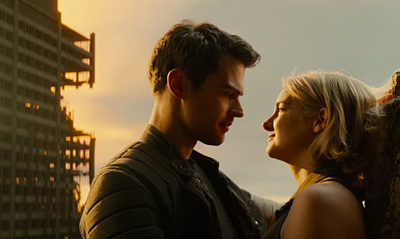Movie Review: The Divergent Series: Allegiant
Ben Gruchow
March 22, 2016
The critic Roger Ebert had a resonant line in an old movie review that I stumbled upon when formulating my assessment of The Divergent Series: Allegiant: He said that "we Americans like to see evil in terms of guns and crime and terrorists and drug smuggling – big, broad immoral activities; rarely … about how one person can be personally cruel to another, through their deep understanding of what might hurt the other person the most." That quote is nearly twenty years old, and just as prescient now as a reflection on our culture as it ever was. I suspect it’ll still be prescient two hundred years from now, when the world of this franchise is supposed to take place. Allegiant, for I will not write out the entire laborious title more than once, contains a surprising germ of reactivity to this concept for a chunk of its running time, up until the point where you can almost hear the grinding sound as the plot consigns itself to genre convention.
I could choose to feel regret over this, or I could choose to feel regret over the fact that I used a perfectly wise Ebert quote about contemporary human nature on a film that will perhaps become best known as the first really big nail in the coffin of the dystopian YA subgenre in film. This series is about gifted young individuals in a post-apocalyptic wasteland version of Chicago, confronted with shifting and deceptive narratives and motivations from the various bureaucratic officials that run the city and the world beyond, and the best thing that Allegiant ever does is posit that the bureaucracy is not necessarily good or evil, but conflicted and suffused with the presumption of knowledge. And like just about everything else we could say regarding this series and its themes and characters, another franchise did it better—most recently The Hunger Games, if we’re talking just about the genre and the market Lionsgate and Summit are aiming for, but we could really toss a rock here at random and hit a more cogent and mature example of what this movie is trying to say.
These gifted individuals are Tris (Shailene Woodley), Tobias (Theo James), Caleb (Ansel Elgort), Christina (Zoe Kravitz), and Peter (Miles Teller); the list goes on, but these are the only five who get more than cursory or token dialogue. They are fugitives from the walled future city of Chicago, which has been previously divided into a system of five factions, with a single personality trait dominating each faction in order to keep the peace. In previous Divergents, the group has overthrown dictatorial leaders and Chicago is now led by what I guess you’d call drifters; they’re known as Factionless. Tris, who is Divergent (more than one personality trait) doesn’t like the Factionless system either, so she escapes from the city with her fellow rebels. Wouldn’t you know that there are parties and councils outside the city watching events transpire with some academic interest; we’re not given much if any information or insinuation as to these parties’ motivation or interest or purpose, but there’s a general feeling of detached pragmatism that I at least found plausible, if not exactly textured or subtle. Tris and cohorts are taken to the Bureau of Genetic Welfare, where they learn about a Purity War and the concept of Pure genetic material and Damaged genetic material.
Continued:
1
2
|
|
|
|




